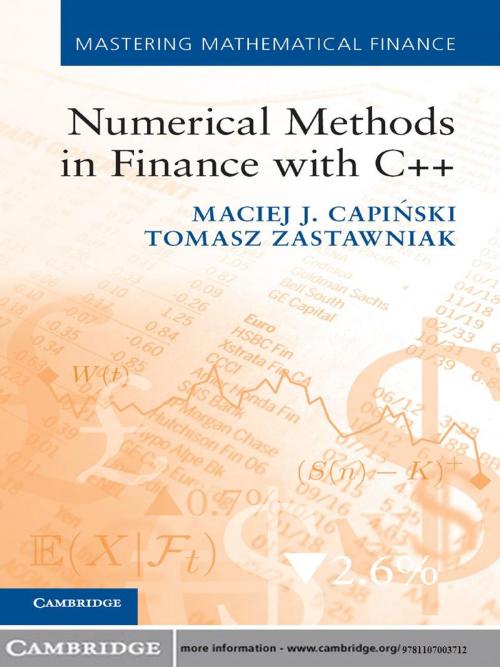Numerical Methods in Finance with C++
Business & Finance, Economics, Statistics, Nonfiction, Computers, General Computing| Author: | Maciej J. Capiński, Tomasz Zastawniak | ISBN: | 9781139539753 |
| Publisher: | Cambridge University Press | Publication: | August 2, 2012 |
| Imprint: | Cambridge University Press | Language: | English |
| Author: | Maciej J. Capiński, Tomasz Zastawniak |
| ISBN: | 9781139539753 |
| Publisher: | Cambridge University Press |
| Publication: | August 2, 2012 |
| Imprint: | Cambridge University Press |
| Language: | English |
Driven by concrete computational problems in quantitative finance, this book provides aspiring quant developers with the numerical techniques and programming skills they need. The authors start from scratch, so the reader does not need any previous experience of C++. Beginning with straightforward option pricing on binomial trees, the book gradually progresses towards more advanced topics, including nonlinear solvers, Monte Carlo techniques for path-dependent derivative securities, finite difference methods for partial differential equations, and American option pricing by solving a linear complementarity problem. Further material, including solutions to all exercises and C++ code, is available online. The book is ideal preparation for work as an entry-level quant programmer and it gives readers the confidence to progress to more advanced skill sets involving C++ design patterns as applied in finance.
Driven by concrete computational problems in quantitative finance, this book provides aspiring quant developers with the numerical techniques and programming skills they need. The authors start from scratch, so the reader does not need any previous experience of C++. Beginning with straightforward option pricing on binomial trees, the book gradually progresses towards more advanced topics, including nonlinear solvers, Monte Carlo techniques for path-dependent derivative securities, finite difference methods for partial differential equations, and American option pricing by solving a linear complementarity problem. Further material, including solutions to all exercises and C++ code, is available online. The book is ideal preparation for work as an entry-level quant programmer and it gives readers the confidence to progress to more advanced skill sets involving C++ design patterns as applied in finance.















